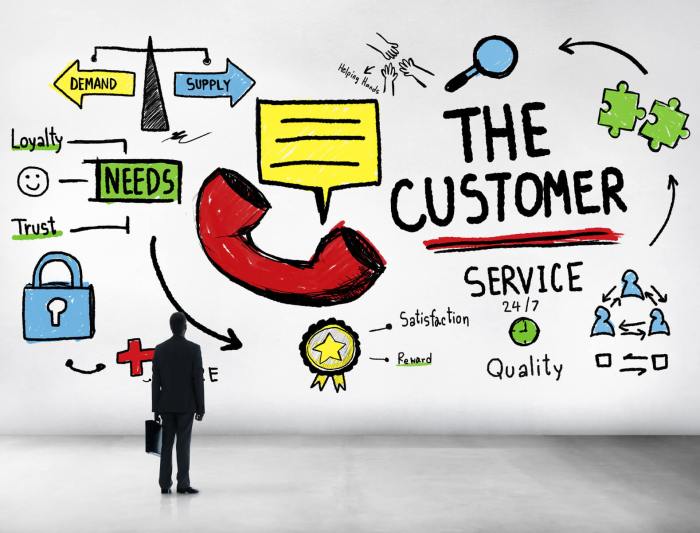Customer Service Excellence sets the stage for unforgettable interactions, highlighting the key aspects of providing top-notch service that leaves a lasting impact. Step into a world where exceptional service reigns supreme, and discover the secrets to creating loyal customers through remarkable experiences.
In this detailed exploration, we’ll delve into the definition, key elements, strategies, and importance of training in achieving Customer Service Excellence. Get ready to elevate your customer service game to new heights!
Definition of Customer Service Excellence

Customer service excellence in a business context refers to consistently meeting and exceeding customer expectations through exceptional service delivery. This includes providing personalized attention, resolving issues promptly, and creating a positive customer experience.
Examples of Companies Known for Exceptional Customer Service
- Amazon: Known for its fast delivery, easy returns, and responsive customer support.
- Zappos: Renowned for its customer-centric culture, free shipping, and hassle-free return policy.
- Nordstrom: Provides exceptional in-store and online customer service, including free alterations and personalized styling recommendations.
Impact of Customer Service Excellence on Customer Satisfaction and Loyalty
Customer service excellence plays a crucial role in enhancing customer satisfaction and building customer loyalty. When businesses consistently deliver exceptional service, customers are more likely to have positive experiences, feel valued, and develop trust in the brand. This, in turn, leads to repeat business, positive word-of-mouth referrals, and long-term customer relationships.
Key Elements of Customer Service Excellence
Delivering excellent customer service relies on several key elements that work together to create a positive experience for customers. Effective communication, empathy, and problem-solving skills are crucial components in achieving customer service excellence.
Effective Communication
Effective communication is essential in providing excellent customer service. It involves actively listening to customers, clearly conveying information, and addressing their needs promptly. By communicating clearly and empathetically, customer service representatives can build trust and rapport with customers, leading to a more positive interaction.
Empathy
Empathy plays a significant role in providing exceptional customer service. By putting themselves in the customer’s shoes and understanding their perspective, customer service representatives can respond with sensitivity and compassion. This helps in creating a personalized experience that makes customers feel valued and understood.
Problem-Solving Skills
Effective problem-solving skills are crucial in resolving customer issues efficiently and satisfactorily. Customer service representatives must be able to identify the root cause of a problem, propose solutions, and follow through to ensure customer satisfaction. By demonstrating strong problem-solving abilities, customer service professionals can enhance the overall customer experience.
Strategies for Achieving Customer Service Excellence
To achieve customer service excellence, businesses can implement various strategies that focus on meeting and exceeding customer expectations. By providing exceptional service, companies can build customer loyalty, increase customer satisfaction, and ultimately drive business growth.
Proactive vs. Reactive Approaches
- Proactive Approach: Proactively addressing customer needs and issues before they arise is a key strategy for achieving customer service excellence. This can involve anticipating customer demands, providing personalized solutions, and continuously improving processes to enhance the overall customer experience.
- Reactive Approach: Reacting to customer concerns and feedback as they come in is another important aspect of customer service excellence. While proactive approaches focus on prevention, reactive approaches involve timely responses to customer inquiries, complaints, and requests for assistance.
Successful Customer Service Excellence Initiatives
- Amazon: Amazon’s customer-centric approach, with features like fast shipping, easy returns, and personalized recommendations, has set a high standard for customer service excellence in the e-commerce industry.
- Zappos: Zappos is known for its exceptional customer service, offering free shipping both ways, 24/7 customer support, and a generous return policy. This commitment to customer satisfaction has earned them a loyal customer base.
- Ritz-Carlton: The Ritz-Carlton hotel chain is renowned for its impeccable customer service, focusing on personalized experiences, attention to detail, and employee empowerment to create memorable stays for guests.
Importance of Training and Development in Customer Service Excellence

Training and development play a crucial role in achieving Customer Service Excellence by ensuring that employees have the necessary skills and knowledge to deliver exceptional service.
Cultivating a Customer-Centric Culture
Implementing training programs focused on customer service helps instill a customer-centric mindset within the organization. By emphasizing the importance of understanding and meeting customer needs, employees are better equipped to provide outstanding service.
Maintaining High Standards
Ongoing training and development programs are essential for maintaining high standards of customer service excellence. Continuous learning allows employees to stay updated on best practices, new technologies, and customer preferences, ensuring that they can consistently deliver exceptional experiences.
Best Practices for Training Customer Service Representatives, Customer Service Excellence
- Provide comprehensive training on products/services: Ensure that representatives have in-depth knowledge of the company’s offerings to effectively address customer inquiries.
- Focus on communication skills: Train employees on active listening, empathy, and effective communication techniques to enhance customer interactions.
- Encourage role-playing exercises: Engage representatives in simulated customer scenarios to practice handling various situations and improve their problem-solving skills.
- Offer feedback and coaching: Provide regular feedback and coaching sessions to help employees identify areas for improvement and enhance their customer service skills.
- Promote a culture of continuous learning: Encourage employees to pursue further training and development opportunities to expand their knowledge and expertise in customer service.





